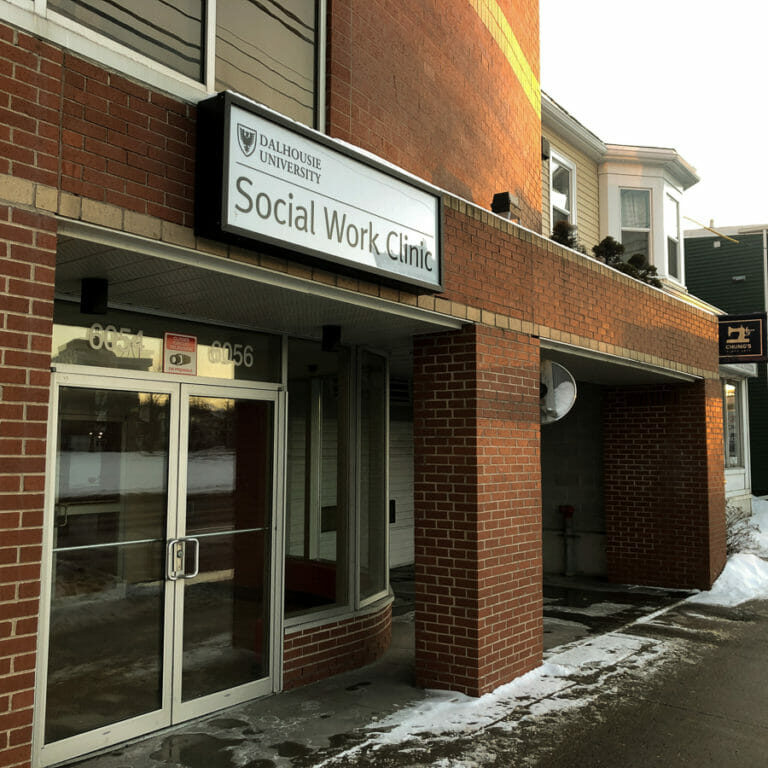
Dal Social Work clinic finds home on Quinpool
Students gain work experience while serving the community
The Dalhousie School of Social Work Community Clinic found a long-term home.
The clinic started as a pilot project in 2014 and opened in its new space at 6054 Quinpool Road late last semester. It will continue to operate there for the foreseeable future.
The clinic acts as both a hands-on learning environment for students but also as an asset to the community.
According to the Dalhousie University website, the clinic offers undergraduate and graduate students in Health Professions an opportunity to learn frontline practice from a social justice and anti-oppressive perspective, to provide support and advocacy, and to enhance existing front line services by supporting their work and collaborating on complex cases.
“It started from seeing that there was nothing for folks that were marginally or precariously-housed, that were living on the streets, and there were no supports in case management, counselling support, that came from an anti-oppressive lens,” said Dr. Jeff Karabanow, professor and co-manager of the clinic.
“Four years later, and we have been overwhelmed by community support, student interest from an interprofessional lens, as well as from our client need. From this, we really feel like we’ve built more of a sustainable platform, financially and through our work in the community.”
In the four years the clinic has been open, said Karabanow, they have seen over 400 clients, trained over a hundred students and have worked with more than 40 organizations –– including various universities and government organizations, as well as Dalhousie University.
Bridging the gap
Within the clinic, there are various departments that can provide help with a variety of needs from psychology to social work to occupational therapy. There is also access to a pharmacy and nutrition resources.
“We work with people experiencing poverty, homelessness, are marginalized and need support in one way or another. We are really guided by the client and their needs, whether that revolves around financial work, advocacy, supportive counselling,” said Karabanow. “We work with folks that are experiencing a lot of physical, mental and emotional health issues and we really try to support them in their day to day living.”
Social workers deal with many different aspects of a community, explained Karabanow.
They are responsible for helping individuals, families, and groups of people to cope with the problems they’re facing to improve their patients’ lives. This help can consist of immediate referral to another place that can help with the specific issue or can end with the social worker being involved for months or even years. Students such as Meagan Bowers describe social work as a challenging, but rewarding career.
“The clinic tries to bridge the gap between the community and the university and gets to see some of the very real issues that people go through in the process. A lot of the issues our clients suffer from are close to me; I’ve seen a lot of hurt and I’ve seen a lot of hardships and those experiences drew me into social work,” said Bowers, a social work student who works at the clinic.
“The clinic has filled a much-needed space in the community. We know we’re doing a good job because new folks are consistently being directed our way and people are starting to recognize the impact we can have with our clients.”
A hands-on experience
The social work program lets students be at the frontline, working one-on-one with clients as they do their placement at the clinic.
Throughout the program, the students work towards being more independent and developing their own caseload –– an opportunity unique to the agency. And the clinic isn’t exclusive to social work students, also welcoming psychology students to work in the mental health aspects of the clinic. This allows students to work closely with the other professions and collaborate to gain outside knowledge in order to meet clients’ needs.
Rebecca Tucker is one of three psychology students at the clinic who works in the mental health branch of social work. She deals with mental health assessments and individual counselling, mainly therapy. Although mental health isn’t the only thing that the clinic deals with, it does play a part in many cases.
“It can be hard to get the help and care you need. It’s scary to have to be on your own and manage everything in your life and your mental health as well. The clinic provides insight into how I can help someone with that within the barriers of the system,” said Tucker,
“When you have this many people in one place that want to support you and will work together for you, it feels welcoming and open and like you have a team behind you. Behind the scenes, we never stop working to try and help you the best we can.”






